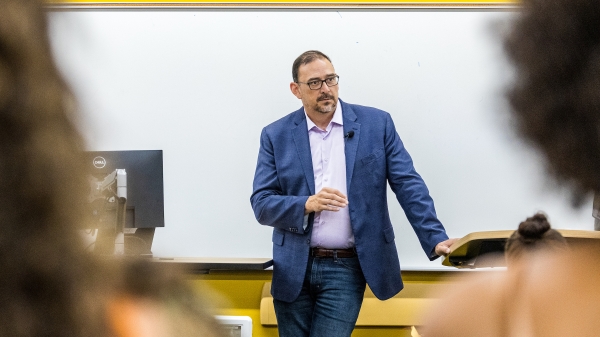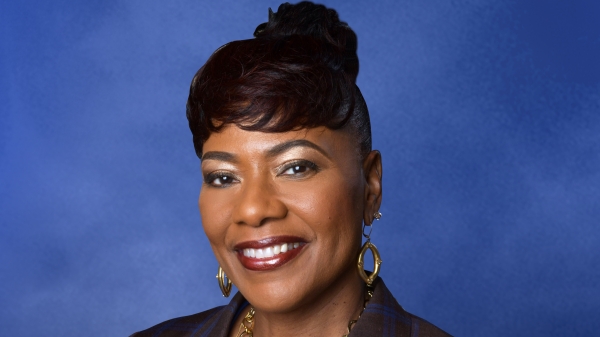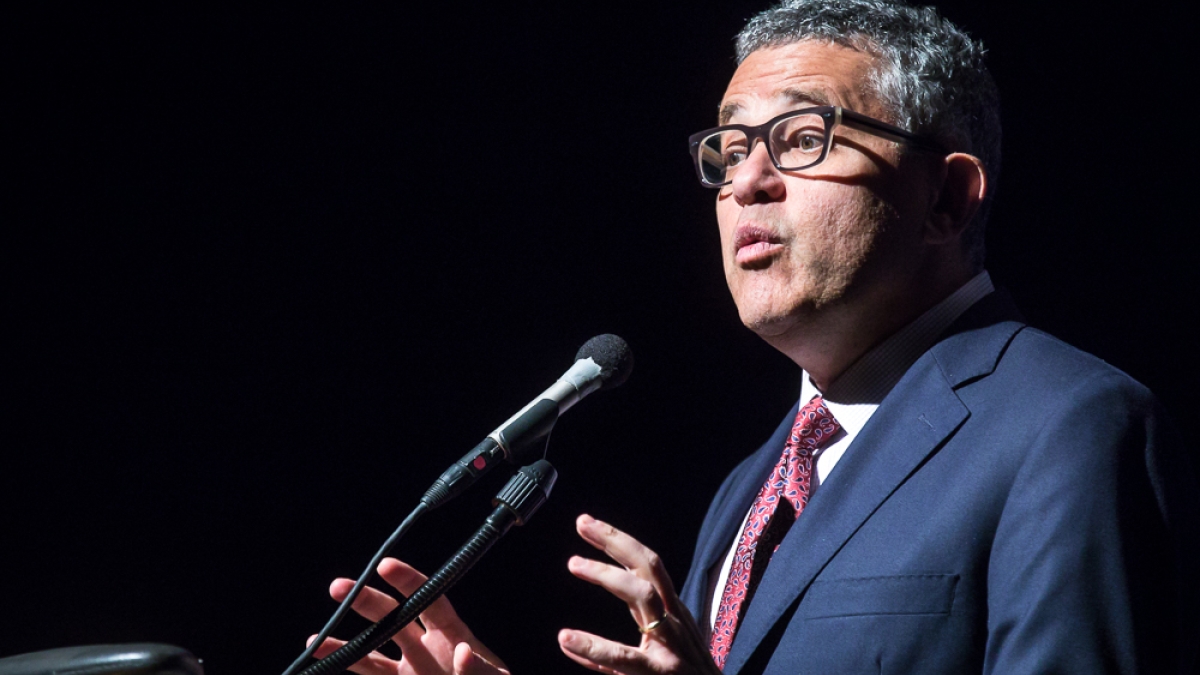The Supreme Court is just as politicized as Congress, and will likely begin to reflect the recent far-right shift of the Republican Party, according to legal analyst Jeffrey Toobin.
“It is often said, it is often hoped, it is sometimes believed that the Supreme Court is a refuge from the partisan divisions in Congress. But I’m here to tell you it’s not true,” said Toobin, who has written two books on the top court.
“It’s a deeply partisan institution, and it’s divided along the same lines as the rest of Washington, Democrats against Republicans, but very evenly so,” he said.
Toobin, lawyer, author, legal analyst for CNN and staff writer for The New Yorker, addressed about 600 people at Tempe Center for the Arts on Tuesday night. His talk, titled “The Supreme Court in the Post-Obama Age,” was the annual John J. Rhodes Lecture in Public Policy, presented by Barrett, the Honors College at Arizona State University.
Toobin traced the political trajectory of the court, starting from the very liberal 1960s, when the justices overturned the law against interracial marriage and upheld protections for the press. He noted that President Richard Nixon appointed four justices in only five years as president, and even though he was Republican, the court remained liberal into the 1970s, overturning the ban on abortion and the death penalty.
“That’s because the Republican Party of the ’70s was unrecognizable from the Republican Party of today,” said Toobin, who wrote “The Nine: Inside the Secret World of the Supreme Court” in 2007 and “The Oath: The Obama White House and the Supreme Court” in 2012.
That began to change with President Ronald Reagan in the 1980s, who pushed for a more conservative judiciary, and who also appointed Sandra Day O’Connor to the court.
“If there has been a greater Arizonan than Sandra Day O’Connor, I don’t know who it would be,” Toobin said. “She is just a giant figure in the history of the law. But she was also not a religious conservative or a social conservative. She was a Westerner, a libertarian style conservative.
“She was one of the votes that saved Roe v. Wade.”
Toobin noted that his lecture was named for John J. Rhodes, a moderate conservative who recognized the value of government. Rhodes, an Arizona Republican who served in Congress from 1953 to 1983, was the driving force behind congressional authorization of the Central Arizona Project, which provides water from the Colorado River to Arizona.
“He embodied a different kind of Republican Party than the one we have today,” Toobin said. “He was a proud conservative, who believed in small government and low taxes.”
He said that the Central Arizona Project was a “big government” project that showed how government could work.
Toobin said that when he wrote his books about the justices, he hoped to uncover personal animosities among the members.
“Somewhat to my disappointment as a journalist but to my satisfaction as a citizen, I learned that was not the case,” he said, noting that the court under Chief Justice John Roberts is genial.
Toobin said that the Supreme Court of more recent years was more conservative with two exceptions — upholding the tenets of Obamacare and affirming same-sex marriage.
When Justice Antonin Scalia died in February 2016, President Barack Obama had 11 months left in his term.
“Mitch McConnell, the majority leader in the Senate, said within an hour of Justice Scalia’s death that there would be no hearing or vote on a successor while Obama was in office.
“And it worked to perfection. The blockade held.”
There was no vote on Obama’s nominee, Merrick Garland, leaving the current court with eight justices, evenly divided between Republicans and Democrats. Trump has nominated Neil Gorsuch, whom Toobin said is brilliant and accomplished.
“He’s very conservative when it comes to the rights of African-Americans, gay rights, voting rights.
“We are in a moment where the conservative Republicans are in the ascendancy, and they are getting the Supreme Court they want.”
Top photo by Charlie Leight/ASU Now
More Law, journalism and politics

ASU's Carnegie-Knight News21 project examines the state of American democracy
In the latest project of Carnegie-Knight News21, a national reporting initiative and fellowship headquartered at Arizona State University’s Walter Cronkite School of Journalism and Mass Communication…

Arizona secretary of state encourages students to vote
Arizona Secretary of State Adrian Fontes looked right and left, taking in the more than 100 students who gathered to hear him speak in room 103 of Wilson Hall.He then told the students in the Intro…

Peace advocate Bernice A. King to speak at ASU in October
Bernice A. King is committed to creating a more peaceful, just and humane world through nonviolent social change.“We cannot afford as normal the presence of injustice, inhumanity and violence,…
